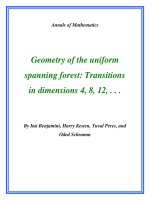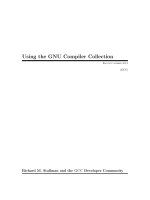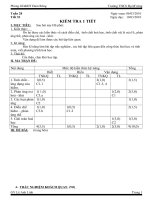4 8 jose marti
Bạn đang xem bản rút gọn của tài liệu. Xem và tải ngay bản đầy đủ của tài liệu tại đây (2.33 MB, 10 trang )
Fascinating Facts
• José Martí’s father was Spanish and his mother
was from the Canary Islands.
• Though famous as a freedom fighter, José Martí
was a small, thin man. Because of an injury he
got when he was imprisoned, he walked with a
cane for the rest of his life.
• José Martí lived in New York for a time. While
he was there, he started a magazine for
children called Edad de Oro, which means
“golden age.”
Genre
Nonfiction
Comprehension Skill
Sequence
Scott Foresman Social Studies
Text Features
• Captions
• Time Line
• Map
José Martí
by Ann Rossi
In this book you will read about José Martí. Martí was
a writer from Cuba. He wanted Cuba to be free. Martí
worked his whole life for Cuban independence. He
died fighting for freedom.
Write to It!
José Martí
José Martí wrote essays and poetry to
Ann about
Rossi liberty. How
express how hebyfelt
do you like to express your own ideas?
Write about liberty. This could be a
short poem, a song, or an essay of one
or two paragraphs.
Vocabulary
exile
immigrant
liberty
Write your ideas on a separate sheet of paper.
revolutionary
patriot
Photographs
Every effort has been made to secure permission and provide appropriate credit for photographic material. The publisher
deeply regrets any omission and pledges to correct errors called to its attention in subsequent editions.
Unless otherwise acknowledged, all photographs are the property of Scott Foresman, a division of Pearson Education.
Photo locators denoted as follows: Top (T), Center (C), Bottom (B), Left (L), Right (R) Background (Bkgd)
ISBN: 0-328-14669-2
Copyright © Pearson Education, Inc. All Rights Reserved. Printed in the
United States of America. This publication or parts thereof, may be used with appropriate
equipment to reproduce copies for classroom use only.
1 2 3 4 5 6 7 8 9 10 V0G1 14 13 12 11 10 09 08 07 06 05
Opener: ©Corbis
3 ©Brown Brothers
4 ©Benvenuti/GTPhoto
5 ©Maps.com/Index Stock
Imagery Offices: Glenview, Illinois • Parsippany, New Jersey • New York, New York
Editorial
7 ©Photo restoration by J.A.Sierra/Timetable History of Cuba/Jerry Sierra
8 ©Historical Picture Archive/Corbis
Sales Offices: Needham, Massachusetts • Duluth, Georgia • Glenview, Illinois
11 ©SuperStock
Coppell, Texas • Sacramento, California • Mesa, Arizona
14 ©Audrius Tomonis
15 (CL) ©Scott Smith/Index Stock Imagery, (TR) ©Jeffrey Boan/Miami Herald Publishing Company
Who Was José Martí?
José Martí was born in Cuba in 1853. Cuba still
belonged to Spain at that time. Cuba had been
a Spanish colony for hundreds of years. Many
Cubans wanted Cuba to be independent from
Spain.
Martí worked to help Cuba gain independence
from Spain. He wrote essays and poems, and he
published newspapers. Many people consider
Martí to be the most important Cuban writer of
the 1800s.
Martí also gathered supplies and organized
a political party to fight for Cuba’s freedom.
In the end, Martí lost his life fighting to make
Cuba free.
José Martí became the national symbol of Cuba’s struggle for
independence from Spain.
2
3
Cuba is the largest island in the West Indies. It is located about
90 miles (145 kilometers) south of Key West, Florida.
This is the house where José Martí was born in Havana.
Martí’s Childhood
José Martí was born in Havana, Cuba, on
January 28, 1853. He was the oldest of six
children. He was the only son.
The family was poor. Martí’s mother made sure
he received a good education. Martí loved to
write. Martí had published several poems by the
time he was fifteen.
4
In 1868 the Ten Years’ War began. The Ten
Years’ War was a Cuban struggle against Spanish
rule. A year later, when he was sixteen, Martí
started a newspaper called the La patria libre
(The Free Fatherland ). Martí had begun his
lifelong fight for Cuban independence.
Martí’s support for Cuban independence made
him an enemy of the Spanish government in Cuba.
He was arrested and sentenced to six years of
hard labor in prison. In 1871 he was sent away
to Spain.
5
Martí in Exile
Martí continued to fight for Cuba’s independence
during his exile, the time he spent away from his
country. He wrote political essays. Martí also wrote
and published a pamphlet about how awful it was
to be a political prisoner in Cuba.
Martí continued his education in Spain. He
became a student at the University of Madrid.
He later studied at the University of Zaragoza.
Martí left Spain shortly after graduating from
the University of Zaragoza. He traveled in France
and then in Mexico, where he continued writing.
Martí then moved to Guatemala and taught
history and literature. It was in Guatemala that
he married Carmen Zayas Bazán. She was the
daughter of another immigrant who had left
Cuba.
Martí was a political prisoner in Cuba.
6
7
This is how Havana, Cuba, looked during Marti’s lifetime.
A Brief Return Home
The Ten Years’ War ended in 1878. The Pact of
Zanjon was signed at the end of the war. It called
for a number of political changes in Cuba. It also
allowed people living in exile to return to Cuba.
Martí and his wife returned to Cuba that same year.
8
Cuba, however, was still governed by Spain.
Martí continued to fight Spanish rule. In 1879
he was exiled once again to Spain. From Spain
Martí went to France and then to the United States.
In 1881 Martí moved to Venezuela and started
a newspaper called Revista Venezolana, or the
Venezuelan Review. That same year Martí returned
to live in the United States.
9
Life in the United States
Martí spent much of his time from 1881 to 1895
in New York City. He continued to write. Martí
wrote newspaper articles, poetry, and essays.
He wrote about his love of freedom, justice, and
education.
Martí worked as a journalist for several Latin
American newspapers. He wrote articles about life
in the United States.
In 1886 Martí wrote an article about the
unveiling of the Statue of Liberty. He described
the parades, the crowds, the speeches, and the
statue. He wrote about the importance of liberty.
He shared his hopes of freedom for his own
people. His articles made him famous throughout
Latin America.
10
Parades, speeches, and
celebrations accompanied
the unveiling of the Statue of
Liberty on October 28, 1886.
Martí spent a lot of time working for Cuban
independence. In 1892 he helped organize
and form the Cuban Revolutionary Party. A
revolutionary is a person who is trying to bring
about a major change in government. During the
next few years, Martí began to gather supplies
and plan an invasion of Cuba.
11
Martí died before Cuba gained independence
from Spain. He was killed in battle on May
19, 1895. Martí had spent his life fighting for
freedom for Cuba. Although he died in battle,
the struggle Martí had begun finally did lead to
Cuba’s independence. Martí became the symbol
of Cuba’s struggle for independence from Spain.
Return to Cuba
In late January 1895 Martí left New York to go
back to Cuba. In April he and other patriots arrived
in Cuba. Patriots are people who love their
country and who are willing to fight for it.
On April 11, 1895, Martí and his followers
began their fight for Cuban independence.
The Life and Times of
José Martí
1874
Martí graduates from university.
1871
1878
Martí is exiled
to Spain.
The Ten Years’ War ends.
Martí and his wife arrive
in Cuba.
1853
José Martí
is born in
Havana, Cuba,
on January 28.
1850
1855
1868
The Ten Years’ War,
Cuba’s first fight
for independence,
begins.
1860
1865
1881
Martí moves to Venezuela and then
settles in the United States.
1870
1869
Martí publishes his first
newspaper, La patria libre.
12
1895
January: Martí leaves
New York for Cuba.
April 11: A new
war for Cuban
independence
begins.
May 19: Martí is
killed in battle.
1875
1880
1885
1879
Martí is exiled again.
1890
1895
1892
Martí helps
form the Cuban
Revolutionary
Party.
13
Students represent their schools in the
José Martí Parade in Miami, Florida.
Martí’s image appears on the Cuban peso.
This monument was built
to honor José Martí.
Martí Remembered
Today many people remember Martí as a hero.
They remember Martí as a supporter of liberty
and as a man who spent his life fighting for his
country. Many people today still read Martí’s
poems and other writings. Schoolchildren also
honor Martí.
14
People can walk along Memorial Boulevard in
Miami to see the monument honoring José Martí.
In late January every year there is a parade held
in celebration of Martí’s birthday.
15
In this book you will read about José Martí. Martí was
a writer from Cuba. He wanted Cuba to be free. Martí
Glossary
worked his
whole life for Cuban independence. He
died fighting
freedom.
exileforbeing
forced to live away
from one’s country
immigrant a person who leaves
Vocabulary
one country to live in another
exile
liberty freedom from the control
of another immigrant
country; independence
liberty
patriot a person
who loves
Write to It!
José Martí wrote essays and poetry to
express how he felt about liberty. How
do you like to express your own ideas?
Write about liberty. This could be a
short poem, a song, or an essay of one
or two paragraphs.
Write your ideas on a separate sheet of paper.
revolutionary
and supports
his or her country
revolutionarypatriot
a person who is
trying to bring about a major
change in government
Photographs
Every effort has been made to secure permission and provide appropriate credit for photographic material. The publisher
deeply regrets any omission and pledges to correct errors called to its attention in subsequent editions.
Unless otherwise acknowledged, all photographs are the property of Scott Foresman, a division of Pearson Education.
Photo locators denoted as follows: Top (T), Center (C), Bottom (B), Left (L), Right (R) Background (Bkgd)
ISBN: 0-328-14669-2
Copyright © Pearson Education, Inc. All Rights Reserved. Printed in the
United States of America. This publication or parts thereof, may be used with appropriate
equipment to reproduce copies for classroom use only.
1 2 3 4 5 6 7 8 9 10 V0G1 14 13 12 11 10 09 08 07 06 05
16
Opener: ©Corbis
3 ©Brown Brothers
4 ©Benvenuti/GTPhoto
5 ©Maps.com/Index Stock Imagery
7 ©Photo restoration by J.A.Sierra/Timetable History of Cuba/Jerry Sierra
8 ©Historical Picture Archive/Corbis
11 ©SuperStock
14 ©Audrius Tomonis
15 (CL) ©Scott Smith/Index Stock Imagery, (TR) ©Jeffrey Boan/Miami Herald Publishing Company









